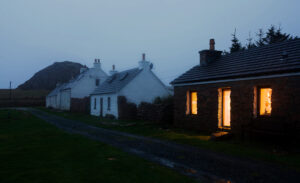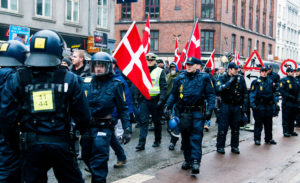When John Maynard Keynes visited Orkney for two months in the summer of 1908, he wrote, enchanted, to a friend from Stromness, claiming “the view from this town is the Bay of Naples and the Island of Capri”.
This stunningly beautiful archipelago off the north-easternmost tip of Scotland is also supposed to be the “happiest place in Britain”. And yet all is not well. On Tuesday, with a show of a dozen or so hands, the islands’ local council gave its support for “alternative forms of governance”, which could reframe its relationship with Westminster in line with crown dependencies such as Guernsey, Jersey and the Isle of Man, or overseas territories like the Falklands. It could attempt to go even further, declaring its independence and reviving its historic links with Norway to becoming a self-governing territory, like the Faroe Islands, an autonomous region of Denmark.
While discussions about going back to their Scandinavian roots are at the exploratory stage — even newspapers haven’t yet settled on whether such a move should be called “Orxit”, “Orkxit” or “Orkexit” — Orcadians seem to be sold on the idea. Reasons for the disgruntlement with Westminster and Holyrood are various, but include under-subsidised ferry fares, a miserly dividend from four decades of North Sea oil exploration and underinvestment by central governments into potentially lucrative wind power projects. As Scotland’s smallest council, it also receives hundreds of pounds less per person than the others.
Certainly, Orkney — and Shetland to its north — is distinct from the rest of the United Kingdom. Geographically closer to Oslo than Edinburgh, the islands retain a strong Nordic character, even though they were last under Norwegian and Danish control in 1472. And life on the archipelago certainly has its upsides. It has good schools, affordable houses, clean air and abundance of space, but its winning edge is a form of Scandinavian communitarianism that instils a profound sense of safety and social trust among its 23,000 residents.
Here, crime is rare — the sort of place where farm equipment is shared and a builder’s yard won’t charge you for half a bag of sand. Nearly 40 years ago, my parents bought a property overlooking Scapa Flow which, with a few short intermissions, had been held by our wider family for centuries. On requesting the door key, the estate agent replied that one didn’t exist. (Despite soaring local house prices, which rose 8.5% last year, the average cost of a property on Orkney is just £221,000.)
“Bleak” is a word only our opponents use to describe the place. True, the first view of the high cliffs and red sandstone of Hoy can seem forbidding. Frightening even, particularly if shrouded in sea fret. And the weather in the Northern Isles is changeable, and best described in quantitative terms. The total absence of trees can upset people — but Orcadians reply, I think correctly, that they would only spoil the view.
It is a quirk of medieval history that the Orkneys — for centuries, a central hinge in a Nordic chain linking Scandinavia with Iceland and Greenland — ever found themselves to be a peripheral province of Scotland. Last month, while raising the prospect of greater autonomy, financial security and economic opportunity for his islands, James Stockan, leader of the Orkney Island Council, noted that “we were part of the Norse kingdom for much longer than we were part of the United Kingdom”. And Stockan believes the islands are being “failed dreadfully”. He recently told BBC Scotland: “The funding we get from the Scottish government is significantly less per head than Shetland and the Western Isles to run the same services — we can’t go on as we are.”
Scotland’s acquisition of Orkney in 1472 was accidental. In 1468, the daughter of King Christian I of Norway and Denmark was betrothed to King James III of Scotland. The marriage treaty promised a dowry of 60,000 Rhenish Florins, but the impoverished Nordic King didn’t have this sum immediately to hand. Consequently, the archipelagos of Orkney and Shetland were pawned to Scotland with the intention of being later redeemed once the cash could be found. Alas, this never happened — a tragic turn for Orkney, which found itself a peripheral province of Scotland. Formal sovereignty was never transferred, and historians have long made the case that Scotland holds Orkney and Shetland in pledge rather than by sovereign right. To this day, Orcadians continue to make this point.
Would Orkney fit back into the Norse realm? Well, Orcadians do wear their Viking heritage with great pride. Norn, the local language of Orkney and similar to Icelandic and Faroese, was gradually replaced by Scots, but survived on the outer islands until the late 1700s. The modern Orkney dialect has a noticeable “sing-song” Scandinavian quality, characterised by a rising intonation at the end of a word (known as “the post-stressed syllable”).
The island also enjoys a strong sense of local patriotism and a separateness to the rest of Scotland. Orcadian poet Edwin Muir once infamously disparaged Scotland as “a sham nation”. In his History of Orkney of the late 1700s, George Low noted that Orcadians were reserved in their sentiments, honest in their dealings with one another, but “studious to conceal their gains”, while also being tenacious in their preservation of old customs. A politeness and civility also seems to pervade the islands, one now sadly absent in many other parts of Britain.
By modern standards, Orkney remains basically monocultural. Of course, the very idea might seem impolite and déclassé in a society where diversity is now promoted as a foundational value. For progressives, monocultures seem unacceptable, exclusionary things, in need of correction. However, Orkney’s monocultural strength makes it far easier for incomers to fit in. Unlike most of Britain, Orcadians set a cultural tone into which new arrivals can assimilate. The setting of clear rules and norms make it easier for outsiders to find a place in the community. It’s not uncommon for settlers from the south, called ferry-loupers, to give their Orkney-born children names such as Erland, Thorfinn and Mangus.
As large states like Britain become increasingly divided, I can see the attraction to Orcadians of re-uniting with their Nordic brethren. There’s a reason the UK government would resist these ideas out of hand though. The oil might be running out, but Orkney played a pivotal part in Britain’s naval operations in both world wars. It was in Scapa Flow that naval aviation was born in 1917, when Squadron Commander Edwin Harris Dunning first landed an aircraft on a moving ship at sea. The loss of the Northern Isles would be a serious strategic loss to the United Kingdom.
While it is difficult to imagine any circumstances in which Orkney would be permitted to leave — only last week, the Prime Minister’s official spokeswoman said: “There is no mechanism for the conferral of crown dependency or overseas territory status on any part of the UK” — an exit from a newly independent Scotland would seem much more promising. After all, if arguments of history and self-determination are ever to grant independence to Scotland, the very same would apply to Orkney. And this is where an even more practical issue would emerge: resources. A fledgling independent Scotland would struggle to balance its budget. Indeed, it may even be uncertain of how to pay its pensions — and in what currency? Without the unwarranted fiscal largesse of the Barnett formula, used to calculate the overall level of funding allocated by the UK Treasury to devolved governments, so-called “Highland economics” would be brutally applied by Holyrood.
It is in these circumstances that the prospect of self-governing status, similar to that enjoyed by the Faroe Islands, might suddenly suit Orkney very nicely. Who wouldn’t wish to be part of a Norwegian state that boasts a $1.4 trillion sovereign wealth fund?
Orcadians are acutely aware from their surroundings that kingdoms rise and kingdoms fall and that political jurisdictions are transitory. The archipelago resembles a pin cushion of archeological sites spanning from the 5,000-year-old Neolithic Stones of Stenness to Pictish brochs from 200 BC, to Viking drinking halls from a mere thousand years ago. What an irony it would be if an Orkney earldom lost to Norway in 1472 through lack of money was lost centuries later by Scotland for the very same reason.
Disclaimer
Some of the posts we share are controversial and we do not necessarily agree with them in the whole extend. Sometimes we agree with the content or part of it but we do not agree with the narration or language. Nevertheless we find them somehow interesting, valuable and/or informative or we share them, because we strongly believe in freedom of speech, free press and journalism. We strongly encourage you to have a critical approach to all the content, do your own research and analysis to build your own opinion.
We would be glad to have your feedback.
Source: UnHerd Read the original article here: https://unherd.com/




